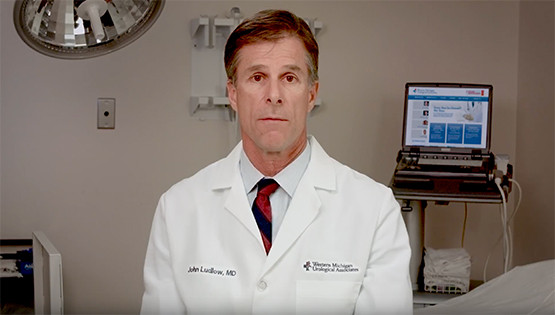Low Testosterone: Common and Easily Treatable
Nearly five million American men struggle with hormonal imbalance, otherwise known as low testosterone. This is a common problem many men face as they age. Though common, this issue has potentially serious ramifications if not diagnosed and treated.
Testosterone is the most important male sex hormone. It helps produce sperm cells, keeps men interested in sex, plays a role in muscle and bone strength, and even affects male hair growth. Low testosterone can affect sex drive, physical features, and mood.
Symptoms may vary but if you experience low energy, depression, lack of motivation, increased body fat, weaker muscles, erectile dysfunction or lack of sexual desire, you should talk to your urology physician. New research indicates men with low testosterone are also at an increased risk for osteoporosis (weak bones), heart disease, heart attack and stroke. Low testosterone makes it more difficult to treat diabetes as well.
Western Michigan Urological Associates has the expert knowledge and compassionate care you need. We provide world-class care and will help you treat this common problem, and we will find the option that works best for you.
Testosterone is the most important male sex hormone. It helps produce sperm cells, keeps men interested in sex, plays a role in muscle and bone strength, and even affects male hair growth. Low testosterone can affect sex drive, physical features and mood. About 5 million American men have low testosterone.
Symptoms of Low Testosterone Include:
- Decreased sex drive
- Inability to get or keep an erection (called impotence or erectile dysfunction), although other issues can also affect the penis and cause erectile dysfunction
- Low sperm count
- Increased breast size
- Hot flashes
- Increased irritability
- Difficulty focusing
- Depression
- Loss of body hair and muscle mass (in severe cases)
Factors That Put You at Higher Risk for Low Testosterone Include:
There may be several risk factors, or causes, for low testosterone, including:
- Age – As a man ages, his body makes less testosterone
- Damage to testicle cells, which can happen from accidents, testicle inflammation, testicular cancer, radiation therapy or chemotherapy
- Diseases affecting the hypothalamus and the pituitary glands
- Certain drugs, including morphine and anabolic steroids
Tests Used for Diagnosing Low Testosterone Include:
Testing for low testosterone will usually involve different types of testing to determine the best course of action for your treatment, including:
- Review of medical history
- Thorough physical examination
- Additional testing may include:
- Bone density scan
- CT scan or MRI to rule out a tumor in the pituitary or hypothalamus
- Genetic testing
Treatment Options for Low Testosterone:
We understand that it can be difficult and sometimes embarrassing to discuss your low testosterone treatment plan. Our doctors are here to help make you to feel at ease throughout the entire process. Here’s what you can expect during treatment:
Hormone Replacement Therapy can take care of many low testosterone symptoms. The therapy provides the body with testosterone to replace what is lost. Hormone replacement therapy may be in given in the following forms:
- Pills
- Injections
- Gel and patches
- Gum tablets
While a low testosterone diagnosis may be a frustrating process, we are here to help you every step of the way to make this process more manageable. It is important that your doctor work with you to accurately diagnose your symptoms and tailor a unique treatment plan to fit your specific needs. We at Western Michigan Urological Associates want to work with you to find the best option for you and your family. Ask Your Primary Care Provider for a Referral.
SOLTIVE™ SuperPulsed Laser System
WMURO patients can now benefit from the latest in stone removal and BPH treatment.
Common Urinary Issues
Have questions about urinary issues? Check out our interactive guide.
Low Testosterone
Get the facts on hormonal imbalance, its signs, symptoms, and statistics in the United States.



